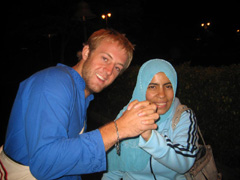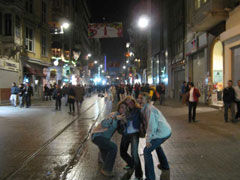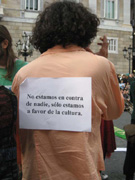Semester at Sea Fall
2006 Voyage 
- Home Page
- My bio
- Multisited
Ethnography Project: Realms of
Conflict Among Youth (Egypt, Turkey, Spain)
- Shipboard Interview
- Japanese Youth: To
Conform or Rebel?
- Vietnam: Youthful
Participation with Children
- Burma: Finding
Never-Neverland
- India: India's Poorest
Caste, the Dalits
- Egypt: A Wife Acquired, A
Dream Fulfilled
- Turkey: Escaping Near
Imprisonment
- Spain: Witness to a
Protest in Barcelona
- Open Letter
Multi-Sited Ethnography Project:
Realms of Conflict among
the Youth In a Supranational Context



I began this journey
with a similar
sentiment to that of many of my peers in the sense of having combined
feelings of nervousness and excitement. Traveling was undoubtedly a new
phenomenon and the overwhelming feeling of anticipation could have
certainly been mistaken for my own apprehension. How was I going to
deal with places that are so foreign and exotic that I would have only
previously imagined them in National Geographic? Would the people
accept me being from America, the world’s self-proclaimed global
superpower? How would I manage to interact and communicate with people
whom speak a language that possesses words I can't even begin to
understand, let alone attempt to decipher between the many tonal
pitches?
These were all questions that ran
through my mind at a light speed as I began this "Voyage of Discovery"
and what quickly became apparent was that I was not just on this
journey to become more familiar with the world, but rather to walk away
with a much deeper and more thorough understanding of my place within
it. These appear to be common symptom of many anthropologists who
conduct research in the field, according to an article written by
George Gmelch entitled "Lessons from the Field" in which he describes
the experience of University students involved in foreign study through
anthropological field schools. He describes the students as having
believed "they had made a mistake" and that it "seemed more of a
challenge than many wanted".
Gmelch mainly focuses his article on the
effects of the student’s immersive cultural experiences on their
perceptions of themselves and their own society. He states that "the
belief that you have to live abroad before you can truly understand
your own culture has gained wide acceptance on college campuses today"
and I would certainly support such a statement. I believe that
regardless of my having not lived in these cultures but rather just
briefly visited, the ability to perform cross-cultural comparisons
proves to be highly significant in the form of both foreign and
intrinsic evaluation.
Considering my fairly better than
surface-level knowledge of the cultures we were about to visit, I
decided to select a subject of cross-cultural ethnographic research
which had previously interested me and would prove to be a topic that I
could invariably understand, the youth culture in public spaces. I was
extremely excited to focus on such a dynamic subject and I would say
that there is a definite advantage to performing cultural observations
on the multi-cultural level. This is clearly expressed in George
Marcus' article entitled "Ethnography in/of the World System: The
Emergence of Multi-Sited Ethnography" wherein he states:
This highly sophisticated statement reiterates the
importance of
conducting research in a multi-sited context because of its
capabilities of developing and connecting the theoretical concepts
within a much broader context.
I was confident that my interest in
eventually becoming a teacher at the High School level combined with my
being twenty one years old and having just come out of my young adult
phase would allow me to easily interact, observe, and even relate to
the many scenarios which I was prepared to encounter with regard to the
youth culture in the oncoming visits to each country. It was in Egypt,
Turkey, and Spain that I encountered my most pervasive and influential
interactions with the youth culture, the first of which is entitled "An
Egyptian Wife Acquired and a Dream Fulfilled."
The conflict we witnessed in Egypt
between two genders was one that was very different than the conflict I
witnessed in Turkey which was a conflict between two ethnic
backgrounds. I describe the event in an essay entitled "Escaping near
Imprisonment in Turkey."
Altogether different than these previous
interactions was the one I experienced in Spain in which I describe yet
another conflict in the form of a peaceful demonstration in an article
entitled "Witness to a Protest Outside
Barcelona Capital Buildings."
As my cross-cultural ethnographic research has now
come to a close I have begun to realize that it not only revolved
around the youth in public spaces as I had intended it to, but also
incorporated a consistent analysis of conflict as well. It is a common
occurrence for a research goal or thesis to change when conducting
ethnographic research and I am glad to see my prior focus on the youth
in public spaces become more specific and to concentrate on conflict
scenarios. I was able to observe the way that genders collide in the
Muslim world, the way that ethnicities conflict within a common border,
and the way a nation's citizens can express dissatisfaction with their
government, all in a supranational context.
When I look back and examine my previously held
notions of anxiousness and nervousness regarding the travels which I
was about to embark on I pleasantly smile with confidence now that I
know how enjoyable foreign travel really is. I found "conducting
research" to be something that I was used to doing simply by paying
attention to the little, almost insignificant, details in order to help
them build upon the bigger picture. Gerry Tierney puts it best in her
article "Becoming a Participant Observer" wherein she explains that the
beginning of her ethnographic research began by being comfortable just
hanging out and by watching every little thing. She states that it was
"through these means that I built some trust among the people and
gained their cooperation in helping me learn about them and their
activities." I simply could not agree more! By walking into a scenario
which I would have liked to observe with an open heart and a humble
smile, I would often times find that people were very welcoming and
willing to share their culture and ideas. It was by way of these
"tactics" that I found the world to be a place filled with intriguing
people full of warmth and beauty.